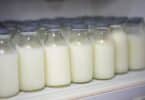Statistics estimate that around 8.6 percent of all children and teens suffer from asthma. That makes it the most prominent childhood illness. It is also a scary and frustrating illness that carries the same symptoms for children as it does for adults: wheezing, difficulty breathing, coughing, and tightness of the chest. Of course, because children have smaller airways, their symptoms are sometimes more severe.This can be especially frightening for both parents and children. Thankfully, a new study suggests that breastfeeding could reduce the occurrence and frequency of these asthma-related symptoms.
Researchers have previously associated genetic variants – those located on chromosome 17 – with the risk of autism. Breastfeeding has been shown to protect against asthma symptoms among children with the 17q21 genetic variant. These children are specifically more likely to have asthma symptoms triggered by environmental factors (dust, mold, pet dander, etc.). Children with this specific variant were the ones that the study authors focused on.
“As research in this field progresses, we are understanding more and more about the gene-environment interaction for the development of asthma,” Dr. Olga Gorlanova of the University Children’s Hospital Basel (IKBB) and the University of Basel, Switzerland, said.
A total of 368 children with the 17q21 genetic variant were included in the study. The researchers gathered information on their occurrence and severity of respiratory symptoms and then compared this to the weeks of breastfeeding to determine if there was a link between the two. According to the results, children were 27 percent less likely to have a flare-up of symptoms on the weeks they were breastfed. On the weeks they were not breastfed, they were more likely to experience environmental asthma symptoms.
“Our study sheds light on how this interaction can be modified by breastfeeding,” Gorlanova said. “This is the first time that we were able to show the effect of the 17q21 variants on respiratory symptoms during the first year of life, depending on breastfeeding status. Our results must be replicated in another cohort.”
Already, breastfeeding is the recommended source of nutrition for infants. Hopefully, this may encourage mothers whose children may be considered at risk for asthma to follow the guidelines, which is to breastfeed exclusively for the first six months and then continue to breastfeed with the addition of other foods until the child’s first birthday (or longer).







